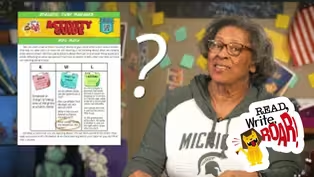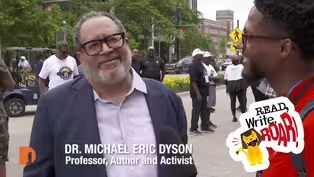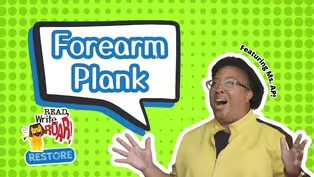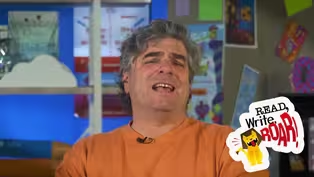Read, Write, ROAR!
Our Rich Land
Season 1 Episode 1021 | 26m 45sVideo has Closed Captions
See how an Athletic Turf Manager keeps sports fields in tip top shape and practice a forearm plank.
Learn about our rich land. First we'll see how an Athletic Turf Manager keeps sports fields in tip top shape. Then we'll prime our brains for more learning as we practice a forearm plank with Ms. AP! Let's go.... Read. Write, ROAR!
Problems playing video? | Closed Captioning Feedback
Problems playing video? | Closed Captioning Feedback
Read, Write, ROAR! is a local public television program presented by Detroit PBS
Read, Write, ROAR!
Our Rich Land
Season 1 Episode 1021 | 26m 45sVideo has Closed Captions
Learn about our rich land. First we'll see how an Athletic Turf Manager keeps sports fields in tip top shape. Then we'll prime our brains for more learning as we practice a forearm plank with Ms. AP! Let's go.... Read. Write, ROAR!
Problems playing video? | Closed Captioning Feedback
How to Watch Read, Write, ROAR!
Read, Write, ROAR! is available to stream on pbs.org and the free PBS App, available on iPhone, Apple TV, Android TV, Android smartphones, Amazon Fire TV, Amazon Fire Tablet, Roku, Samsung Smart TV, and Vizio.
Providing Support for PBS.org
Learn Moreabout PBS online sponsorship- On "Read, Write, ROAR!," learn about our rich land.
First, we'll see how an athletic turf manager keeps sports fields in tiptop shape.
Then we'll prime our brains for more learning as we practice a forearm plank with Ms. AP.
Let's go, "Read, Write, ROAR!"
- [Announcer] This program is made possible in part by the state of Michigan, (upbeat music) and by, and by viewers like you.
Thank you.
(upbeat music) - I love sports of all kinds.
I love fall when I can watch soccer, baseball, and especially Spartan football.
Hmm, as I think about it, those sports are all played outside and the fields they play on are perfect, not a blade of grass out of place.
Hi, scholars.
I'm Mrs.
Mask.
I started to wonder how that grass always look so perfect and I came across a career, athletic turf manager.
Now I'm really curious what this career is all about.
I bet if I break down what the words athletic, turf, and manager mean, it'll help me better understand the athletic.
The word athletic describes a space where a sporting event is held.
Turf, this is the top layer of soil with grass and plant roots.
Manager, this is a person in charge of something.
So from breaking down the job title and thinking about the meaning of each word in it, I've learned that an athletic turf manager is someone who is in charge of taking care of the grass at athletic fields.
I'd like to learn more about this career.
So I found a short video that will help me do that.
I'm going to use a graphic organizer called a KWL chart to help support my learning.
When I'm reading and writing, and even when I'm listening for information like today, a KWL chart can be used.
In a KWL chart, the K column will be where I list what I already know about a career as an athletic turf manager.
The W column will have what I want to know about this career.
Finally, the L column will list what I learned from the video I watched to research this career.
Let's start with what I already know about a career as an athletic turf manager.
Under the K for what I know about career I'll write down, someone who's in charge of taking care of the grass at athletic fields.
Now, I'm going to consider what I want to know.
I'll list questions under the W. Hmm!
(upbeat music) Do all athletic fields use the same kind of turf?
Does an athletic turf manager use any special tools?
What is the science behind turf grass management?
What college classes are needed for this career?
Let's watch this short video from the Curious Crew to find out.
- Are you curious about careers in science?
Hi, I'm Genesis, and I'm here with Amy Fouty, the Athletic Turf Manager at Michigan State University.
So, Amy, tell me what you do here.
- I'm the Athletic Turf Manager for the Intercollegiate Athletic Department here at Michigan State University.
Myself and my staff take care of all the different athletic fields for the department, baseball, softball, soccer, and of course the football facilities for the football team.
(audience cheering) Each sport has a different level of playability, so any field or surface that the athletes are playing on needs to be safe.
So this is called a Field Scout and basically it tells me the volume of water in the soil.
When you're looking at baseball, you wanna have the ball bounce on the grass or the dirt at a certain way.
When you're playing soccer, you want the ball to roll smoothly across the surface.
When you're playing football, you want really good, strong footing so that they can dive and make plays.
- So tell me what's the science behind turf grass management?
- Science behind turf grass management is basically like growing any other plant.
- This is gonna take all my strength.
- If you are helping your mom and dad grow plants in a garden, you have to water it, you have to fertilize it, and you gotta have the right soils to grow what you want.
- Okay, it says 32.6.
- So this area is nice and moist and I don't need to worry about watering it.
We combined science of growing turf, and grass, and soils with the art of maintaining fields.
- What's the most rewarding part of your job?
- The most rewarding part of our job is that we set the stage for greatness.
Seven times a year we fill this stadiums with 75,000 people.
When you talk about the big game, the big plays, that's what we do.
We set the stage for greatness.
(upbeat music) - What a great video and interview.
Now I'm gonna check out what I wanted to know, which is listed in the W column.
Did I get my questions answered?
If so, I'll add what I learned to the L column.
Do all athletic fields use the same kind of turf?
No.
For example, a baseball field needs the ball to bounce on the grass or in the dirt in a certain way, while a ball on the soccer field should roll smoothly.
Does this job use any special tools?
One specific tool that is used in this job is a Field Scout.
It measures the volume or amount of water in the soil.
What is the science behind turf grass management?
It's like growing any other plant.
You water it, fertilize it, and use the right soils to grow what you want.
What college classes are needed for this career?
Well, I didn't find an answer to that, so I'll have to keep looking.
Wow, this video helped me to learn about being an athletic turf manager.
The KWL chart was useful in helping me to think about what I already know about this topic before doing further research, and giving me a place to put questions I want focus on answering, and for organizing my new learning.
Next time you're seeking new information, consider using a KWL chart to help you organize it.
(upbeat music) (bright upbeat music) - Ms. AP, here to help restore your energy.
Before we begin, let's start with our warmup by doing two forward folds.
Standing your tall mountain, arms up, folding over, feeling that stretch, rolling up.
One last time, arms up, folding over, feeling that stretch, rolling back into your tall mountain.
Nice job.
Now that we have warmed up our body, we are ready to exercise.
Today we are gonna start on the floor and learn a slightly different plank position called the forearm plank.
We'll start off on all fours in our tabletop position.
Knees down, hands down, and you are gonna lower yourself down to the ground.
You're gonna tuck your toes.
This time, our arms, our forearms are gonna be flat on the floor.
Push yourself up straight like a pencil, hold it, down to the ground.
Reset.
Take a deep breath in.
Push yourself up, hold it.
Come back down to the ground.
To modify it, bring your feet up.
Push yourself up.
Body straight.
Down to the ground.
One last time, modify forearm plank.
Down to the ground.
We're gonna push ourselves back up in our child pose position.
(upbeat music) We are gonna reset.
And give yourself a big clap clap.
(Ms. AP clapping) (upbeat music) Nice job.
Let's cool down by taking two deep breaths.
Deep breath in.
Deep breath out.
Deep breath in.
Deep breath out.
Great job.
(upbeat music) - Lake Superior is one of the biggest lakes in the world, but not many people know how many amazing stories it has.
Hey, I'm Alexis.
I'm visiting the Marquette Maritime Museum in Michigan's Upper Peninsula to learn all about Lake Superior.
I know that the lake is gigantic, but I wanted to learn more about why it's important and why there's a whole museum about it.
And so far I've learned that even if you've never been to Lake Superior or even the Upper Peninsula, there's a good chance that this lake has made a difference in your life.
Let's head inside and I'll show you what I mean.
For years, Lake Superior has been used for shipping.
People load up boats with all kinds of supplies from around the Upper Peninsula, and then those boats take those supplies across Lake Superior to other parts of Michigan, to other cities on the Great Lakes, and even to other states and countries.
And this has been happening for a long time.
For instance, as far back as thousands of years ago, indigenous people in the Western Upper Peninsula dug small holes in the ground to mine the metal copper.
They turned that copper into things like bracelets and tools, and then they traveled all around Lake Superior and its rivers in things like canoes to trade what they made with people all around North America.
Then later on around the middle of the 1800s, European settlers did the same thing, but they took this to the next level.
Instead of digging small holes, they went deep underground to mine for metal.
They used hammers, chisels, and eventually big pieces of equipment to mine copper and other metals like iron.
Around this time, people also chopped down a lot of the big trees in the Upper Peninsula to get wood for houses and other buildings.
Then all these people took a lot of that metal and that wood and loaded it into boats, and they sailed those boats around the Great Lakes to sell their goods.
The wood from the Upper Peninsula was used to build houses and other buildings all around Michigan and beyond, maybe even some of the old buildings by where you live.
And the metal was used all around the country to make things like wires for electricity.
Some of the people who made money selling these goods also played big roles in their communities around the state.
Instead of keeping all that money for themselves, they sometimes use some of it to help their cities build things like schools and museums that are still around today.
These days there's not a ton of mining still happening in the Upper Peninsula, but it's definitely not all over.
For example, people are still mining the metal iron near Marquette.
So if you come to visit the Marquette Maritime Museum, you might get to see a freighter stopping by the Upper Harbor just up the road visiting town to pick up some iron and take it somewhere else.
These freighters can get up to about a thousand feet long, which is almost as long as three football fields put end to end, and they're the biggest boats on the Great Lakes.
I really love seeing them sail around.
Overall, businesses like mining and logging have really helped the towns and cities in the Upper Peninsula grow.
And today, there are about 300,000 people living here.
So you see why Lake Superior is so easy to get excited about, it's beautiful and so fun to visit, but it's also played a big part in the lives of millions of people.
Without it, cities like Marquette probably wouldn't exist.
And after learning about all of this, I now understand why there is an entire maritime museum here in Marquette.
There are enough stories to fill an entire building, so thanks for joining me.
I'm glad you came.
(upbeat music) - Michigan is a magical land of lakes, rivers, and streams, most of which are clean enough to swim and splash around it.
In fact, Michigan has the longest freshwater shoreline in the United States.
Michigan is also a heavily industrial state with a long history of automotive and steel plants with large smoke stacks that create a lot of pollution.
Did you ever wonder how the lakes, rivers, and streams stay clean in the midst of all that industry?
You might be surprised to learn that one of the biggest factors in keeping water clean is actually dirt, or well, soil.
But how does that work?
How does soil keep anything clean?
Hi everybody, I'm Jeff Kass, and today we're gonna learn how soil is crucial in keeping our lakes, rivers, and streams clean.
How does that even make sense?
How can soil, something we might connect with the idea of dirt or being dirty, make anything clean?
Here's what happens.
Certain dangerous chemicals, say from a factory or a coal plant leach or slowly leak and dissolve into soil.
This often happens in a liquid form and interacts with the minerals that make up soil, and those minerals can act like a kind of filter or sponge that can catch the dangerous chemicals before they make it to a water source, like a stream or a lake.
And then the soil minerals work to dissolve the dangerous chemicals.
The same is also true for toxic germs or bacteria.
The minerals in soil are kinda like mini superheroes who stop chemical villains from infecting our water sources.
So have I convinced you that soil and the minerals in it are important to keep our water clean?
Let's explore this idea a little further by writing a poem, we express our gratitude or say thank you to the soil for the good work it does.
We'll use personification as a writing tool and pretend we can speak directly to soil as if it can understand us.
We'll say thank you by pointing out how we understand what it does to keep our lakes streams and rivers clean.
We'll also wanna let the soil know we understand its job is not easy, that it faces challenges like erosion, which is the process where soil can be damaged, diminished, or even eliminated over time by rain, or wind, or human built elements like too much construction.
Last, we'll talk about what we're gonna do to help soil confront its challenges such as planning more vegetation to keep it stronger.
A good thing to add to the poem would be experiences where you've personally enjoyed yourself in a lake or a river.
When you add in those kinds of personal experiences, you're telling the soil you really do appreciate its work 'cause you understand when the soil works hard the result is clean water that you can enjoy.
I'll try it first.
Here's what I came up with.
You'll notice S is capitalized for soil 'cause we're making the soil be alive like a person through that technique, personification.
"A Poem of Gratitude for Dirt."
"Thank you, Soil.
I know you work hard and that sometimes we don't appreciate you as much as we should.
We dump chemicals and trash and germs onto you and into you and don't even think about what we're doing.
But deep down, we are grateful, even if we don't always show it.
It is you, Soil, who chops on the chemicals that leak from gas stations and auto factories and coal and steel plants.
It is you, Soil, who uses your magic minerals to break down the danger, so when the rain flows into our lakes and rivers, we can swim and dive and frolic and even swallow water without getting sick.
It is you who absorbs the poisons, so fish won't die before we catch them.
It is you who allows bears, and beavers, and wolverine to drink when they're thirsty and still be alive.
Soil, we owe you so much.
We must take care of you.
Listen, a lake in Dexter taught my children how to swim.
I can still see them running through the sand, splashing into the water, growing more and more confident with each step as their feet squirmed into the soft mud, how they learn to duck their heads under and the joy of return when they emerge again in the sun, and gulp new air.
Soil, I thank you for giving me that memory, for protecting our lakes and rivers and if we must plant more trees, more grass, more vegetation to feed you, enrich you, keep you strong, know that we will do it.
We love you, Soil, we are so grateful, we thank you for everything you do."
Okay, did you notice how I spoke directly to the soil as if it could hear me?
Did you notice how I thanked it for doing the specific work it does to absorb dangerous chemicals so they don't make it into our water?
Did you notice I talked about a personal experience where I watch my children learn how to swim in a lake in Dexter, Michigan.
Now it's your turn.
Write a poem where you thank the soil for what it does to keep our water clean.
Write at least 20 lines.
My poem was really long, I know.
You don't have to write as much as I did, but try to include a personal experience.
Tell the soil how much you appreciate it.
And then you know what?
Go outside.
Find some soil and read your poem to it.
Let the soil feel how much you care.
(upbeat music) - Hello, friends.
I'm Ms. Audra, and today we're going into a recording studio in our imagination.
We're gonna make melodies, we're gonna sing notes with our voices, and we can even sing words if we want to.
And so, think about that as we take our breath together.
Here we go.
Let's take a deep breath, (upbeat music) and hold and blow out.
♪ Whoa I wanna sing ♪ ♪ Is the blowout today ♪ And one more time in, and hold and blow out ♪ Roar ♪ Nice.
So remember, you're gonna make a melody with your voice and you're gonna make a movement.
You might be holding a microphone, maybe you're playing an instrument that has a melody to it, but you're gonna make whatever melody you want.
And if you wanna sing words, you can sing words.
On the count of three, we're gonna do it and I'm gonna listen.
One, two, three.
(upbeat music) Keep it up.
Keep it up everybody.
And I'm gonna add my notes and my melody.
♪ La, la, la ♪ ♪ La, la, la, la ♪ Nice.
And on the count of three, one, two, three, and pause.
(upbeat music) Nice.
So together we made a beautiful soundscape of melodies.
There might have been some words in there, whatever sounds that came out, it was all that we created together.
A soundscape of melody.
Thank you for joining.
Let's take that deep cleansing breath together.
Here we go.
(upbeat music) And as you blow out, blow out any way you want.
I'm gonna ooh.
(upbeat music) All right, we'll see you next time.
(upbeat music) - The Michigan Central Train Station played a large role in the Civil Rights Movement of 1963.
Thousands of people from Detroit and other parts of Michigan traveled to Washington DC to participate in the march where Dr. Martin Luther King Jr. delivered his famous "I Have a Dream" speech.
They gathered at the Michigan Central Train Station to board trains for the nation's capital.
The station was a key departure point for activists and supporters of civil rights.
Well, hello, scholars, I'm media literacy Maddie.
I'm practicing my script for a film about Michigan Central Train Station.
As a narrator of the script, it's important to impact the audience, how do you think I'm doing so far?
Let's check in on Ms. Kara.
She's watching a film about the March on Washington and learning about how to analyze the media maker's purpose of the film.
- Hello, scholars.
I'm Ms. Kara, and I'm so glad you're here.
I love to watch lots of different kinds of movies and films.
How about you?
Because there are so many kinds of films, I always find it helpful to understand what the film's main purpose is first.
Is it to entertain, inform, or persuade?
Today I'm watching a short documentary film called "From Detroit's Walk to Freedom to the March on Washington: 60 Years of Civil Rights Legacy."
This film was produced by one Detroit for Detroit PBS.
A documentary is a nonfiction or factual film whose purpose is designed to inform the viewer about real events and people.
Let's watch a segment of the film together to see if we can understand what the producer for this film was hoping to achieve by including this in the film.
- Why is it a little known fact that Dr. King rehearsed "I Have a Dream" speech here in the city of Detroit first before he took it to DC?
- Well, you know how it is, man.
you getting your sing on at one place before you go sing.
- You working it out.
- Yeah, that's right.
You working out the kinks and stuff, and this ain't no small place, Detroit.
If you can do it in Detroit, then you can withstand all kinds of critique 'cause people here are rigorous about performance, about intelligence, about oratory and the like.
- When filmmakers edit their films, they have to be intentional about the choices they make so their films don't get too long.
After watching that short segment, I'm certain the filmmaker included the quote from Dr. Dyson because it was convincing in letting the viewer know the purpose of the film is to inform the audience about Detroit's role in the Civil Rights Movement, specifically leading up to the march on Washington, and Dr. Martin Luther King Jr's "I Have a Dream" speech.
Before watching this, did you know Dr. King had practiced this famous speech in Detroit?
Now it's your turn to practice being a filmmaker.
Do you have a piece of paper and a pencil handy?
If you were going to write a short film about your home or school, what would the purpose of it be?
Faking back to the purpose of media literacy Maddie's film about Michigan Central Train Station, I'm going to write, "The purpose of the film is to inform the viewer about the history of the Michigan Central Train Station."
(upbeat music) The next time you watch a film designed to inform, entertain, or persuade, don't forget to think about the media maker's purpose for creating the film as you are viewing.
(upbeat music) - Thank you so much for watching.
For activity guides, videos, lessons, and so much more, be sure to visit our website, michiganlearning.org.
And don't forget to read, write, roar!
(upbeat music) - [Announcer] This program is made possible in part by the state of Michigan and by, and by viewers like you.
Thank you.
(upbeat music) (dramatic music)
Create a Recording Studio Soundscape | Ms. Audra | Read, Write, ROAR!
Video has Closed Captions
Clip: S1 Ep1021 | 2m 16s | Join Miss Audra in the recording studio! Create melodies using your voice and imagination. (2m 16s)
Discovering Turf Management: Careers in Sports | LaDonna Mask | Read, Write, ROAR!
Video has Closed Captions
Clip: S1 Ep1021 | 6m 45s | Explore the career of an Athletic Turf Manager with Mrs. Mask! (6m 45s)
How to Analyze the Purpose of a Film | Ms. Kara | Read, Write, ROAR!
Video has Closed Captions
Clip: S1 Ep1021 | 4m 23s | Learn how to analyze the reasons filmmakers create specific works. (4m 23s)
Read, Write, ROAR! Restore - Forearm Plank
Video has Closed Captions
Clip: S1 Ep1021 | 2m 34s | Challenge yourself with the forearm plank in this 2-minute movement snack with Ms. AP. (2m 34s)
Thank You, Soil: Writing a Gratitude Poem | Jeff Kass | Read, Write, ROAR!
Video has Closed Captions
Clip: S1 Ep1021 | 6m 35s | Learn how soil filters toxins and prevents pollution, then write a gratitude poem. (6m 35s)
Providing Support for PBS.org
Learn Moreabout PBS online sponsorship

- Home and How To

Hit the road in a classic car for a tour through Great Britain with two antiques experts.












Support for PBS provided by:
Read, Write, ROAR! is a local public television program presented by Detroit PBS





